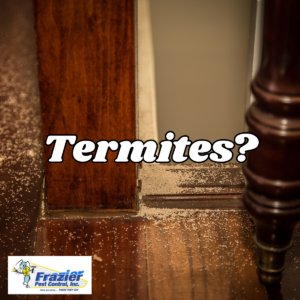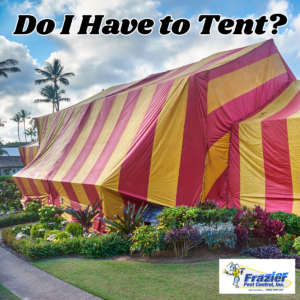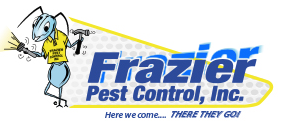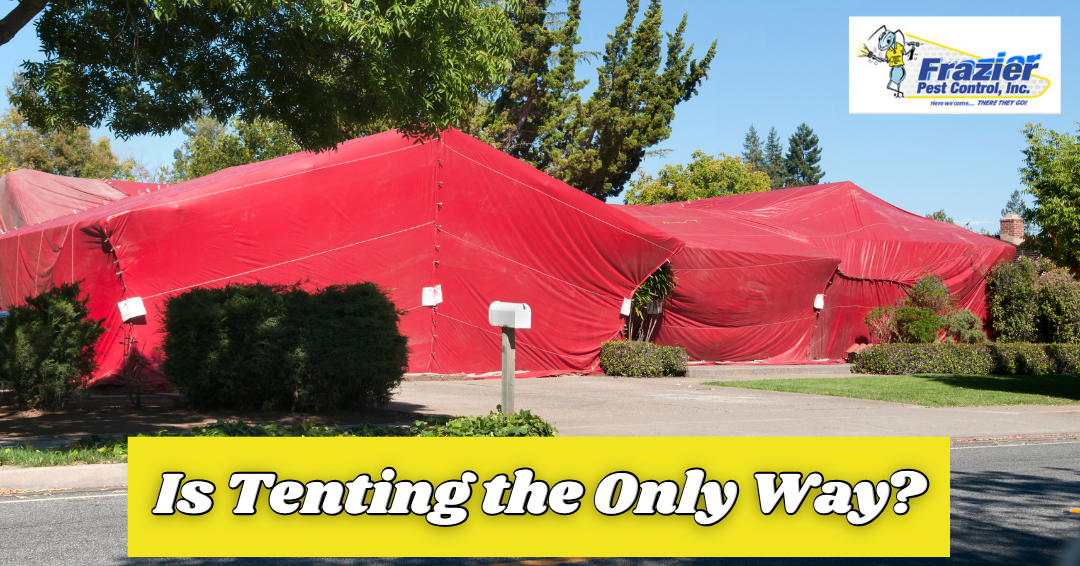Termites are one of the most destructive pests in the Coachella Valley, silently compromising the structural integrity of homes year-round. When residents discover a termite problem, one of the first questions they ask is: “Do I have to tent my home to treat termites?” While tent fumigation is a highly effective treatment, it’s far from the only option available.
At Frazier Pest Control, we specialize in identifying the right solution based on the type of termite, the extent of the infestation, and the needs of each homeowner. In this article, we’ll explore what tenting is, when it’s necessary, and what alternative termite treatments are available, including localized treatments, heat, and bait systems. Whether you’re dealing with a minor infestation or planning preventative care, understanding your options is key to protecting your home.
Read more: Insects in Palm Springs, CA: What You Need to Know
Understanding Tenting: What It Is and When It’s Used
Tenting, also known as structural fumigation, involves covering your entire home with a large tarp and filling the structure with a fumigant gas (typically sulfuryl fluoride). The gas penetrates all wood and hidden crevices, eliminating drywood termites in every stage of life.
Tenting is most effective for:
- Large, widespread infestations of drywood termites
- Homes where localized access is limited (attics, behind walls)
- Real estate transactions requiring whole-structure treatment
Pros of Tenting:
- Highly effective at eliminating all active drywood termites
- Reaches inaccessible areas that spot treatments may miss
- Covers the entire structure in one comprehensive approach
Cons of Tenting:
- Requires temporary relocation (usually 2–3 days)
- Food, medicine, and plants must be removed or sealed
- No residual protection—does not prevent future infestations
Read more: Mice in Coachella Valley Homes: Signs, Risks, and Removal
No, Tenting Is Not the Only Way to Treat Termites
While tenting is effective, it’s not always necessary—especially if the infestation is localized or you’re dealing with subterranean termites, which rarely respond to fumigation. Fortunately, there are several proven alternatives that are safer, more targeted, and often more convenient for homeowners.
Read more: Identify Desert Harvester Ants in Coachella Valley Homes!
Alternative Termite Treatments Available in the Coachella Valley
1. Local (Spot) Treatment
 Spot treatments involve applying termiticide directly to the area of infestation using injectors, foams, or sprays.
Spot treatments involve applying termiticide directly to the area of infestation using injectors, foams, or sprays.
Best for:
- Early-stage drywood termite infestations
- Accessible areas such as window frames, door jambs, or eaves
Advantages:
- No need to vacate your home
- Less invasive and more affordable
- Minimal preparation required
Limitations:
- Only treats visible and accessible colonies
- May miss hidden infestations without a thorough inspection
At Frazier Pest Control, we use advanced detection tools like moisture meters and borescopes to locate termites in hard-to-reach places, making spot treatments more effective.
Read more: Argentine Ants in the Coachella Valley: The Unstoppable Invasion
2. Heat Treatment
Heat treatment, or thermal remediation, involves raising the temperature inside your home or targeted zones to around 120–135°F—hot enough to kill termites at all life stages.
Best for:
- Drywood termite infestations that are localized or moderate
- Homeowners seeking non-chemical alternatives
Advantages:
- Eco-friendly—no chemicals used
- Kills termites in one treatment
- No residue or toxic fumes
Limitations:
- Not suitable for subterranean termites
- May not penetrate dense wood or structural voids as deeply as fumigation
- Requires temporary evacuation during the procedure
Read more: How Coachella Valley Homeowners Can Combat Fleas: Your Guide to a Flea-Free Home
3. Termite Baiting Systems
For subterranean termites, baiting systems like Sentricon® are extremely effective. These systems are installed around your home and contain a growth inhibitor that termites bring back to their colony, slowly eliminating it.
Best for:
- Subterranean termite infestations
- Long-term monitoring and prevention
Advantages:
- Non-invasive—no drilling or trenching required
- Targets the entire colony
- Can prevent future infestations
Limitations:
- Slower results compared to direct treatments
- Requires regular monitoring and maintenance
Read more: Bark Scorpion in Coachella Valley: What You Need to Know to Stay Safe
4. Soil Treatments
Liquid termiticides such as Termidor® are applied around the foundation to create a protective barrier. This method is ideal for both treating and preventing subterranean termite infestations.
Best for:
- Homes at risk of ground-based termite invasion
- Pre-treatment for new construction
Advantages:
- Long-lasting residual protection
- Kills termites on contact and through colony transfer
Limitations:
- May require trenching or drilling
- Not effective against drywood termites
Read more: Goodbye Cockroaches! Ultimate Guide to Safe and Effective Cockroach Control
Choosing the Right Way to Treat Termites: Factors to Consider
 Every home—and every termite infestation—is different. The best treatment method depends on several factors:
Every home—and every termite infestation—is different. The best treatment method depends on several factors:
- Type of termite (drywood vs. subterranean)
- Extent of infestation (localized vs. widespread)
- Accessibility of infestation sites
- Homeowner’s schedule and budget
- Sensitivity to chemicals or environmental concerns
At Frazier Pest Control, we begin with a thorough inspection and provide homeowners with a clear, honest assessment of their situation. We’ll walk you through all available treatment options and help you make the most informed decision for your home.
Read more: Goodbye Cockroaches! Ultimate Guide to Safe and Effective Cockroach Control
FAQ: Termite Treatment Options Explained
Q: Can I treat termites myself without tenting?
While DIY treatments may kill visible termites, they rarely eliminate the colony. Over-the-counter sprays can offer short-term relief, but only professional tools and expertise can fully address the root of the problem. Frazier Pest Control uses EPA-approved treatments and advanced detection tools that ensure effective, long-term solutions, without tenting when it’s not necessary.
Read more: Carpenter Ants: Eliminating Infestations in Coachella Valley Homes
Q: How do I know if tenting is absolutely necessary?
Tenting is generally recommended when a drywood termite infestation is widespread or inaccessible through local treatment. Signs that tenting might be required include termite droppings (frass) in multiple rooms, visible damage in hard-to-reach places like attics, or prior spot treatments that failed. A licensed inspector can determine if the infestation can be localized or if a whole-structure approach is warranted.
Read more: Expert Pest Management for Coachella Valley
Q: What is the safest termite treatment for families and pets?
Heat treatments and baiting systems are often considered the safest because they don’t involve toxic chemicals or require the removal of personal items. However, all treatments we offer at Frazier Pest Control are safe when applied by trained professionals and according to label guidelines. We always prioritize your family’s safety in our treatment plans.
Read more: Bird Removal Solutions: Protect Your Coachella Home
Q: Is termite treatment covered by homeowner’s insurance?
Most standard homeowners’ insurance policies do not cover termite damage or treatment because it’s considered preventable with regular maintenance. That’s why it’s critical to invest in annual inspections and proactive treatment strategies. Early detection can save thousands of dollars in repair costs.
Read more: Termite Swarms: The Hidden Threat to Your Coachella Valley Home
Q: How can I prevent the need for tenting in the future?
Preventative measures can go a long way in avoiding costly whole-home treatments. These include:
- Scheduling annual inspections
- Fixing leaky faucets and moisture problems
- Keeping firewood and mulch away from the home
- Sealing cracks and crevices in foundations and walls
At Frazier Pest Control, we offer maintenance programs that include regular monitoring and spot treatments as needed, often eliminating the need for tenting altogether.
Final Thoughts
Tenting may be the most well-known way to treat termites, but it’s not the only option—and for many homeowners in the Coachella Valley, it’s not the right one. Advances in pest control technology now offer a range of safe, effective, and non-invasive termite treatments. Whether you’re dealing with drywood or subterranean termites, the best approach begins with a professional inspection.
At Frazier Pest Control, we believe in honest evaluations and customized solutions. We’ll help you choose the safest and most effective treatment for your unique situation, tenting only when absolutely necessary.
Schedule Your Termite Inspection Today
Don’t wait for visible damage. Call Frazier Pest Control at (760) 328-6115 to schedule your free termite inspection or learn more about our alternative treatment options. Your home’s protection starts with a single visit.


Recent Comments